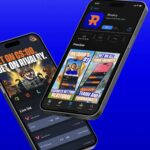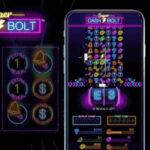Evoplay brings Adrenaline Rush instant game to DC Lottery

Game studio Evoplay has entered the North American lottery space via a partnership with DC Lottery, bringing its instant game Adrenaline Rush to District of Columbia players.
This will be the first collaboration between Evoplay and the DC Lottery, in partnership with lottery game studio EQL Games.
The move follows the company’s partnership with Caesars Entertainment in Ontario back in September.
Evoplay Head of Lottery Frank Cecchini said, “Partnering with the DC Lottery is a significant milestone for our North American expansion. Adrenaline Rush is the perfect introduction to our portfolio; it’s exciting, visually striking, and bridges the gap between traditional lottery entertainment and the interactive experiences today’s players expect.”
Adrenaline Rush has been adapted for the DC region to comply with regulations and responsible gambling standards and is available to both digital gaming and traditional lottery players.
DC Lottery iLottery Product Marketing Manager Jeff Toliver added, “Adrenaline Rush delivers a unique blend of speed, skill, and style that is a perfect fit for the DC market. With Evoplay’s innovative approach, we have added fresh energy to our online portfolio and are thrilled to bring Adrenaline Rush to our player base.”
Abi Bray brings strong researching skills to the forefront of all of her writing, whether it’s the newest slots, industry trends or the ever changing legislation across the U.S, Asia and Australia, she maintains a keen eye for detail and a passion for reporting.
Verticals:
Sectors:
Topics:
Dig Deeper
The Backstory
How we got here
Washington’s lottery has been widening its digital funnel, courting suppliers with portfolios built for eInstants and hybrid play across web and retail. That strategy accelerated this year as the DC Lottery brought in new content partners and formats aimed at mobile users who expect casino-like experiences inside a regulated lottery app. The latest tie-up adds a fast-play title adapted to local standards and pitched as a bridge between scratch mechanics and interactive gaming. It follows a series of deals that underscore a maturing U.S. eInstant market and rising competition for screen time.
The District’s move is not happening in isolation. State lotteries nationwide are refreshing online catalogs with layered features, bonus rounds and branded series more familiar to slots and social casino players than to classic draw games. Vendors are responding with products that promise higher engagement while meeting responsible play rules, identity checks and geofencing. The result is a new content race in jurisdictions that allow iLottery, with DC testing breadth and speed as it builds out its lineup.
DC’s digital lottery push
In parallel with the current launch, the DC Lottery has opened its platform to larger libraries of eInstants. In a separate deal, Allwyn North America secured distribution of a catalog that stretches to hundreds of titles, including a localized version of its Cash Bolt franchise. The rollout began with Super Cash Bolt, which has been a staple of European lotteries and arrived in the District through technology from Instant Win Gaming. Inside that arrangement, Allwyn uses Instant Win Gaming’s remote game server to deliver content across devices, a model designed for quick add-ons and seasonal refreshes. That move was detailed in Allwyn North America launches instant games with DC Lottery.
DC’s choices reflect a broader pivot toward modular infrastructure and multi-supplier catalogs. It allows the lottery to mix branded series, skill-tinged mechanics and short-session games without long development cycles. The approach also hedges against overreliance on a single studio and creates room to A/B test formats, price points and bonus depth. As more vendors plug into the same tech stack, the lottery can vary experiences while keeping payment, compliance and player protections consistent.
Evoplay’s North America beachhead
The current launch builds on Evoplay’s steady North American push. The studio won license approval in Ontario and struck a distribution deal with Rivalry to bring a slate of twenty titles to the province. The province has become one of the largest regulated markets on the continent since opening, and suppliers treat it as a proving ground for content performance and regulatory readiness. That step was covered in Evoplay brings online gaming titles to Ontario via Rivalry partnership.
Evoplay has also leaned into regional partnerships outside the United States to build recognition with North American players. In Mexico, the studio extended its reach through aggregator SkillOnNet, bringing video slots, table games and arcade-style crash titles to local platforms such as PlayUZU.mx. That expansion aims at a fast-developing, regulated market where quick-play formats are gaining traction. Details are in SkillOnNet launches EvoPlay games in Mexico.
These steps set the stage for the District. Ontario offers regulatory rigor and player liquidity, while Mexico provides scale and audience familiarity with real-time features. Together they give Evoplay context to tune mechanics, session length and localization before entering a U.S. lottery channel that demands responsible play controls and omnichannel compatibility. The DC adaptation underscores that shift from pure casino aesthetics to lottery-compliant design.
Innovation reshapes eInstants
The content arms race extends beyond one studio. Instant Win Gaming has pushed wheel mechanics, player-selected outcomes and dynamic multipliers into lottery eInstants. In New Hampshire, the company debuted Wheel Spin Spectacular, a title that lets players choose between multipliers and bonus features and applies a spinning wheel to alter results on each play. The launch illustrates how lotteries can borrow from casino game loops without sacrificing simplicity. The first rollout and the supplier’s contract extensions in two states through 2027 were outlined in New Hampshire Lottery launches Instant Win Gaming’s Wheel Spin Spectacular.
For DC, the availability of multiple vendors experimenting with interactivity creates a competitive benchmark for any new instant game. Players who encounter wheel spins, collectable bonuses or skill-style decisions elsewhere will expect similar pacing and polish. That puts pressure on newcomers to balance novelty with regulatory guardrails, including time-outs, spend limits and clear prize disclosures. The aim is stickiness without promoting excessive play, a fine line in a jurisdiction that positions its lottery as a revenue engine for public programs.
Social casino sets expectations
Beyond regulated lotteries, social casinos continue to condition U.S. audiences to arcade-forward mechanics and frequent updates. Golden Matrix Group recently expanded its presence across five social brands operated by Blazesoft, adding proprietary Expanse Studios content to sites that cover forty-six states. The company framed the deal as a route to scale and cost control through in-house development, widening distribution of crash and table games built for short sessions. The move was reported in Golden Matrix Group brings games to Blazesoft social casinos.
While social platforms do not offer cash wagering in the same way as lotteries, they acclimate players to swift feedback loops, daily rewards and evergreen content drops. That raises the bar for lottery games, which need to draw attention without blurring lines between entertainment and gambling under stricter rules. The District’s strategy of mixing recognizable series with new-to-market formats aims to meet those expectations while keeping message discipline on odds and limits.
The stakes for DC and suppliers
For the DC Lottery, adding more instant titles is a revenue and retention play. It broadens the product shelf for existing customers and targets mobile users who rarely visit retailers. The move complements earlier catalog expansions, such as the Allwyn integration, and relies on technology layers that enable frequent content swaps. If engagement rises without raising problem gambling indicators, the lottery can justify more launches and deeper supplier benches.
For Evoplay, the District offers proof it can localize games for a U.S. lottery audience after building footholds in Ontario and Mexico. Success would support additional state-level bids and partnerships with platform providers that serve multiple jurisdictions. The competitive field is crowded, with incumbent suppliers advancing their own eInstant mechanics and road maps. But a well-received DC rollout could validate the studio’s strategy of adapting interactive titles to lottery standards.
The broader trend points to continued convergence. Lottery eInstants are adopting casino-inspired features, casino suppliers are tailoring content to public sector requirements and social platforms are shaping player tastes. DC’s latest addition fits squarely in that arc. The question now is whether consistent content velocity and careful design can convert attention into sustainable returns for the District without eroding the responsible play posture at the core of state-run gaming.








